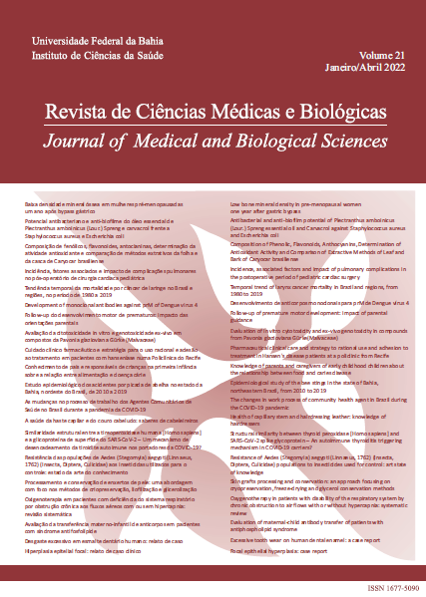Epidemiological study of the bee stings in the state of Bahia, northeastern Brazil, from 2010 to 2019
DOI:
https://doi.org/10.9771/cmbio.v21i1.45286Keywords:
Abelhas. Envenenamento. Saúde Pública. EpidemiologiaAbstract
Introduction: envenomation and deaths by bee stings have increased in all regions of Brazil. However, there are few epidemiological studies on them, especially in the states of northeastern Brazil. Objective: to determine the epidemiological characteristics of bee stings in the state of Bahia, Northeastern Brazil, from 2010 to 2019. Methodology: this is a descriptive and analytical epidemiological study conducted through a retrospective survey of secondary data provided by the database of the Notifiable Diseases Information System of the Ministry of Health. Results: between 2010 and 2019, a total of 7,979 cases were analyzed. Incidents were distributed in 356 municipalities, with the highest frequency in the regions of Agreste and Sertão da Bahia. Cases occurred in all months of the investigated years, with a greater occurrence in urban areas, affecting mainly adult men. The anatomical region of the body most affected by the sting was the head and most cases received medical care within 3 hours after the incident. Local manifestations were more frequent than systemic ones. The injuries were predominantly classified as mild and progressed to cure. Conclusions: the high number of cases and their extensive spatial distribution reveal that bee stings may be considered an emerging and neglected public health problem in the state of Bahia.
Downloads
Downloads
Published
How to Cite
Issue
Section
License
Copyright (c) 2022 Journal of Medical and Biological Sciences

This work is licensed under a Creative Commons Attribution 4.0 International License.
The Journal of Medical and Biological Sciences reserves all copyrights of published works, including translations, allowing, however, their subsequent reproduction as transcription, with proper citation of source, through the Creative Commons license. The periodical has free and free access.


